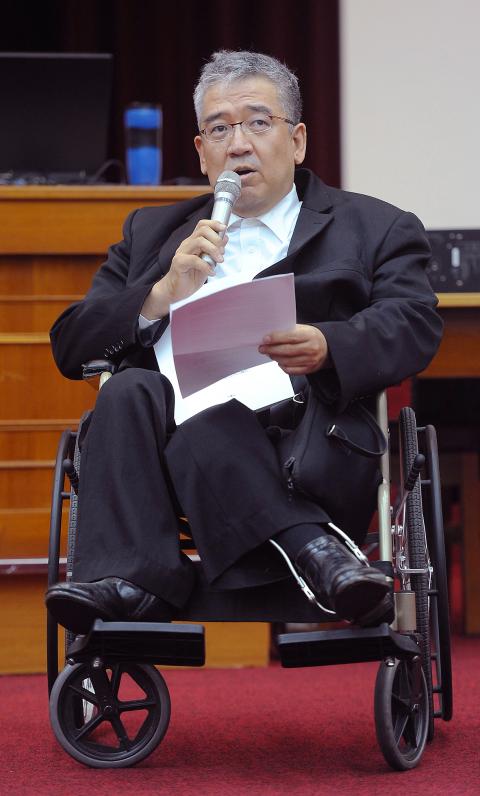|
Presidential adviser
resigns over service trade pact
STRONG WORDS: Rex How said Ma must either be an
‘autocrat’ or ‘impossibly stupid’ not to understand how the pact affects public
livelihoods and national security
By Shih Hsiu-chuan / Staff reporter

Locus Publishing Co chairman Rex
How expresses his opposition to the cross-strait service trade agreement at a
public hearing at the legislature in Taipei yesterday. How also read his letter
of resignation from his post as a presidential adviser.
Photo: Liu Hsin-de, Taipei Times
In a strongly worded letter to President
Ma Ying-jeou (馬英九), publisher Rex How (郝明義) resigned as an adviser to Ma, whom
he said was either an “autocrat” or was “impossibly stupid.”
How, chairman of Locus Publishing Co (大塊文化), who has been pushing for the
government to renegotiate a cross-strait service trade agreement signed on June
21, said he was resigning because of the way the president had dealt with those
who oppose the agreement.
The past month has seen growing opposition to the agreement from people from all
walks of life, but Ma’s response has shown that not only is he “biased” against
those who oppose the agreement, but he also has a “wrong understanding of three
fundamental issues” that are vital to national interests, How said.
Ma was “derelict in his duty” because he did not take seriously criticism of the
agreement, which could deprive people of their property and livelihood, having
failed to conduct an assessment of the impact of the agreement on the nation’s
economy, society and security before it was signed, he said.
How said he had advised Ma two years ago that China is not an ordinary signatory
to the WTO, but a country that has more than 1,000 missiles targeting Taiwan.
How added that Ma also took notes when he advised him in 2009 that the
government should handle cross-strait negotiations in a public and transparent
way, and tell the opposition parties about these negotiations so that they can
form a consensus and get their endorsement.
“The truth about cross-strait ties is the two sides are in a state of war,” but
money has replaced artillery shells in this war, he said.
Cross-strait policy is a “matter of life and death” and the government should
not ignore national security in handling cross-strait agreements, he said.
Ma has also failed to recognize the seriousness of signing an agreement through
backroom negotiations, which places the Ma administration in opposition to
“decades or efforts to promote democracy in this nation,” he said.
The way the government signed the agreement with China on service trade — which
contributes about 70 percent to the nation’s GDP and provides employment to
about 4 million to 5 million people — without discussing it first with the
legislature has “seriously undermined the convictions and values in a democracy,
and violated due process that an elected government should observe,” How said.
He added that the Ma administration has avoided questions about the agreement —
who were behind the negotiations, how were the industries selected and what was
discussed in the negotiations?
“Having an agreement like this, which has caused such fierce controversy, we
only knew who signed off on it, nothing more,” he said. “No one has ever told us
who was the mastermind, what was the strategic thinking it was based on.”
How said that he could only think of two possibilities — Ma is either an
“autocrat” or “impossibly stupid” — to have signed such an agreement, which
could endanger the nation’s 23 million people and only increase economic growth
by a marginal 0.025 to 0.034 percent, as an official report has predicted.
How reiterated that the president must either be an “autocrat” or “impossibly
stupid” to have said that criticism of the pact is deliberately facricated
rumors.
How made public his letter of resignation when he attended a public hearing
hosted by a joint committee led by the legislature’s Internal Administration
Committee. The agreement is pending ratification to take effect.
The government has warned opposition lawmakers not to revise the agreement
during the deliberation, saying that any changes made to the pact could derail
ongoing negotiations on similar trade agreements with other countries.
How said that responsibility for any controversy arising from the signing of the
agreement, for any damage that could undermine the nation if the legislature
were to demand that the government renegotiate the pact with China, and for
other fallout resulting from a delay in implementation of the agreement “all lie
with you [Ma].”
They could have been avoided if the government had made the negotiation process
transparent and had thoroughly communicated with affected industries in advance
as well as assessed its impact on national security, he said.
|
![]()
![]()
![]()